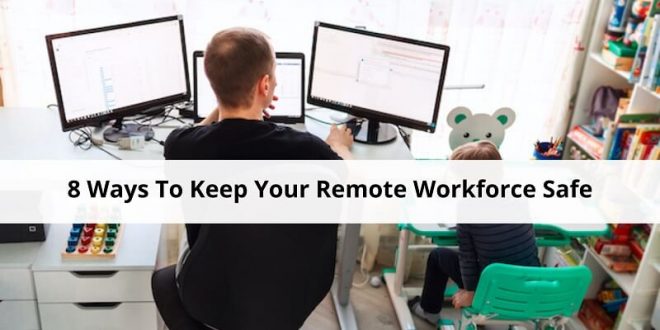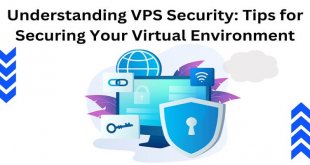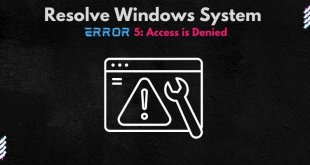Hey guys, In this article, I have listed the 8 ways to keep your remote workforce safe. So keep reading.
COVID-19 Pandemic has given a significant rise to the trend of a remote workforce.
When the Pandemic was wreaking havoc on the masses, companies decided to move their operations online back in 2020.
Working from home has its benefits for the employees. For example, 77% of remote employees believe that they can work more productively from the comfort of their homes.
But companies don’t think so. It is challenging for companies to keep track of their employees and ensure they are working in secure cyberspace.
So, we decided to go over eight tips that will help you keep your remote employees safe.

8 Ways To Keep Your Remote Workforce Safe From Cyberattacks:
1. Personal Devices Can Prove Fatal To Keep Your Remote Workforce Safe:
You must check their personal devices.
Unlike your office systems, a personal desktop might not have the necessary safety measures installed.
Its admin passwords might be weak or injected with a virus or malware.
All these factors can jeopardize your information, and in case of a system hack, your valuable business operation might get stolen.
Thus, it is better to ensure that each employee working remotely has proper security measures in place.
2. Recognize The Important Employees:
Virtual Private Networks are a great way to safeguard your business operations, but they may not be a solution for all employees, so you must figure out who are the heads of departments.
Share your VPN with them and deny others access to sensitive databases and files.
That way, you can track how many people access your information and where they are located.
Moreover, you can further streamline the process by ensuring that only a handful of people have your passwords, and they will decide who will need them and when.
3. Train Your Employees Remotely:
As a company looking to thrive in tough times, you must ensure that every employee has at least a basic education about network systems.
It would be best to ask them to switch to work networks instead of using their personal networks for work.
You must check with every employee regularly whether everything is working well at their end or not.
At times, employees don’t even know what blunders they have made; in that case, you should call them once in a while and ask them to confirm the network settings with you.
4. Make Sure That Your Website Is Safe To Operate On:
Don’t simply wait for a mistake from your employee’s end. You must also check whether you have your website security covered or not.
You can install an SSL or Secured Socket Layer certificate that will ensure that your website’s communication with your clients passes over a secure network where no hacker can intercept it.
We recommend you use a cheap wildcard SSL, where the SSL can provide equal protection to all your chosen domain and unlimited sub-domains, eliminating the risk of cyberattack to a large extent.
5. Don’t Let Your Employees Store Data On Their Computers:
No matter how secure your employee’s personal device is, it is always vulnerable to suspicion because your employee uses their personal device for professional and personal purposes.
Wise companies never allow their employees to store data on their computers. Instead, they ask them to store it on a cloud.
Cloud storage is much safer and is easily accessible from anywhere. However, you must ensure that the cloud service provider is 100% genuine and has never been breached in history.
6. Secure Your Apps With Multi-Factor Authentication:
Usernames and passwords have a higher chance of getting hacked, which is why you must allow a 2-factor authentication system where after entering the password, an employee is required to enter the One-Time-Password sent to his mobile number.
Cybercriminals have gotten advanced with time; if they set their eyes on your application, they can inject bugs that can trace a user’s credentials.
Specific tools can predict what a password could be by analyzing a person’s social profile.
Thus, always keep a multi-factor authentication system in place for your applications.
7. Always Plan For A Data Breach:
Nobody wishes a data breach to become a reality in their life but, they do happen, and they can happen to anyone.
So, it is always best to have a plan in place for such situations.
Each employee should be clear about what they will do in case a data breach happens.
Each employee in your organization must have a basic knowledge of cybersecurity wherein they must be trained for the situation of a cyberattack.
Moreover, it would be best always to have data backups in place so that cyberattacks cannot stop you from dying in your tracks.
8. Have An Employee Policy In Place:
You might have made your employees clearly understand what they can access and what they cannot yet; there is no harm in creating a policy.
In case of an employee dispute, you can quickly push the policy and settle it.
Moreover, a policy should clearly define the process and powers of each employee and his department.
There should not be any confusion in any employee’s mind because remote employees cannot be managed and listened to in-house employees.
Thus, create a robust employee policy for your business.
To Conclude
Working from home can be fun for employees, but it is much of a headache for employers.
In a company setup, remote employees are hard to keep track of as they cannot be contacted face-to-face.
They cannot be quickly called upon in a meeting or a discussion. Moreover, the safety of their devices and network connections is a big concern for companies, so having a system in the organization is crucial.
Amidst the COVID-19 Pandemic, you cannot ask your employees to join the office, but you can ensure they operate from a safe network, device, and space.
So, these were the best practices for securing your remote workforce. Follow them today and create a robust remote work infrastructure for your employees.
 free html design Free html design templates
free html design Free html design templates






